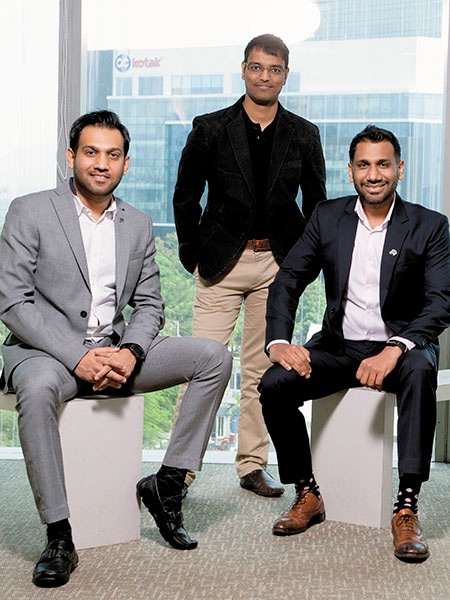Zebpay and its big bet on bitcoins
The founders of Zebpay, a bitcoin exchange, believed in the cryptocurrency way before it became fashionable. Now, they are reaping the benefits


 (From left) Zebpay co-founders Sandeep Goenka, Mahin Gupta and Saurabh Agrawal
(From left) Zebpay co-founders Sandeep Goenka, Mahin Gupta and Saurabh Agrawal
Image: Mexy Xavier
Mahin Gupta looks at his phone and smiles. It is a Saturday morning and other than the founders and a few programmers there are not many people in the office of Zebpay, a bitcoin exchange company, on the tenth floor of a building in an upcoming area on the Sabarmati-Gandhinagar highway.
He immediately hands over the phone to co-founders Sandeep Goenka and Saurabh Agrawal. We are having a Gujarati breakfast that includes gathiayas and dhoklas, and Gupta’s excitement quickly takes over the mood of the morning. “We touched a million downloads for our app," Gupta says. “We were so waiting for this moment."
It’s a clear validation of their belief in the potential of bitcoin and of their idea behind Zebpay, which they put in place in 2014. Bitcoin is a cryptocurrency that was created in 2009 based on the premise of no transaction costs (by cutting out the middlemen or banks), anonymity of users, and that it would not be tied to any country or its regulations. But while the idea was good, it has not been easy for regular people to use this currency for practical purposes since bitcoin addresses are complicated and require e-wallets to store them. The idea behind Zebpay, say the founders, was to take bitcoins to the general public.
To buy and sell bitcoins, people need an exchange. And while exchanges, which bring buyers and sellers on the same platform to exchange the currency for a price mentioned in dollars, are common across the world, the founders of Zebpay wanted to make the process simple, to make it as easy as, say, using WhatsApp messenger. “We worked hard to understand and solve the pain point of understanding bitcoins. We made a key decision that mobile phones are huge in India and internet penetration is big through phones. So we decided on an app-only presence in India," says Agrawal, 41, CEO of Zeb Ventures, makers of Zebpay. Bitcoin exchanges like Unocoin and Coinsecure existed but they were websites while the Zebpay app, a first of its kind, would enable users to buy, store and spend bitcoins through their mobile numbers. “Our idea was to make bitcoins simple and we have moved in that direction," he adds.
What the Zebpay founders also understood was that getting a user base was critical and now, with a million downloads of the app in just over two years, they have quickly come a long way. There are many other sites that allow users to transact in bitcoins but Zebpay says it has a market share of 70 percent in India and trade volumes worth around ₹70 crore a day the company charges a commission of 0.5 to 1 percent. Revenues were $2 million for FY2017. Exchanges are a sticky business, and buyers and sellers rarely move from one exchange to another as they want to stick to an exchange that has higher volumes.
“Zebpay has built a base for bitcoin in India and has taken it to the general public. Today, the space is thriving, but two years ago it was a different and difficult world," says Praveen Kumar, CEO, Belfrics Global, a cryptocurrency exchange operating in India.
Goenka, COO, agrees the increase in the number of downloads has a lot to do with the price of bitcoins, which has gone through the roof. Over the last two years, the average price of owning a bitcoin has gone up by 10 times or so, from $376 to $3,900. But that wasn’t the case when they started out. “It is crazy now. But when we started Zebpay we had no idea the price would shoot up. We were here to build a business model and not play the valuation game. We were also lucky that we were all based in Ahmedabad as it was easy to connect and drive the idea," says Agrawal.  A display monitor with cryptocurrency exchange rates, which are quoted in US dollars
A display monitor with cryptocurrency exchange rates, which are quoted in US dollars
Image: Shutterstock
Both Agrawal and Goenka credit Gupta for his knowledge about bitcoins and his vision to start a company that would do business in the cryptocurrency space. Gupta, 34, the CTO of Zeb Ventures, is a software engineer who began his career with Zeus Learning in 2006 and then started his own company Triston Software Solutions where he got the opportunity to work for an Australian bitcoin exchange in 2012. For months he was intrigued by the concept and studied the technology. He also realised that bitcoin would become much more than just a cryptocurrency and decided to make a career in the field.
Meanwhile, Goenka, 39, in a parallel world, was also developing an interest in bitcoins. He had done his MBA from the SP Jain Institute of Management and got into the family textile business in 1998. But technology remained his first love and though he adopted technology in various departments, including a cloud-based ERP (a business process management software), he wanted to do and learn more. In May 2013, along with a friend, he started an app company for which he went about looking for funding.
Angel investors knew Goenka came from a business family and couldn’t understand why he was looking for funding. After meeting a few such investors, Goenka dropped the idea of starting his own company and, taking a break from his family business, decided to become an angel investor himself. He invested a small amount of capital in the technology space thinking he would get to learn more about technology. “I don’t know how it happened but I was ranked amongst the top angel investors in a magazine in 2014 when my total investment was less than ₹15 lakh, but it helped me network," he says.
In the same year he also became interested in bitcoin and when he came across Gupta’s company in Ahmedabad called buysellbitco.in, he thought it would be a good idea to invest in it. He asked Gupta to meet him at a restaurant. Two hours into the meeting, he decided to join him in his venture instead. “Sandeep is like that foodie who is looking for new food. It is not about eating the food but being more knowledgeable about all the new food options in the city and trying to understand which one will trend," Gupta says with a laugh.
[qt]Zebpay has built a base for bitcoin in India and has taken it to the public.[/qt]
But Goenka says he also realised the bitcoin business was more complicated than he had thought and decided to reach out to Agrawal, who was experienced in the technology space, in building businesses and was well-networked with angel investors. He had been a friend for many years and they had wanted to work together at some point.
In June 2014, when Goenka met Agrawal and tried to explain the idea and bitcoins to him, Agrawal, he recollects, had a blank look on his face. “I was on the sofa and next I was standing on the table… I was literally hopping about, I was so excited to tell him about this new business. But he was sceptical," Goenka says. Eventually, Agrawal realised Goenka was serious and decided to take a chance and joined Goenka and Gupta.
Though all three had different goals—Gupta wanted to be a pioneer in technology, Goenka wanted to spot the next big trend and Agrawal wanted to create a big business—they had one common goal: To take bitcoin to the masses. The blockchain technology, which runs the bitcoin network, allows a buyer and a seller to trust each other over an untrusted network, while the Zebpay app would help users buy and store bitcoins without any complexities.
In September 2014, they took their concept to the BitAngels Startup Pitch Competition held at Las Vegas, where there were around 300 bitcoin-related startup companies talking about their ideas. Zebpay was voted number one at the competition in terms of the quality of the idea, and that gave them the confidence that their idea was workable. Agrawal, who had a good connect with angel investors, was able to raise ₹4 crore through three rounds of funding. The first investment was made by Amit Agarwal, an angel investor who simply trusted the three.
“We also got in touch with Nishith Desai Associates, a legal advisory firm, to understand the legal standing of bitcoin in India," says Agrawal. They were advised to register the company in Singapore and then, over a period of time, launch the exchange in India. While in some countries bitcoin is even accepted as legal currency, others have gone to the extent of banning exchanges. India is still in a flux as far as the regulation of bitcoin is concerned, although buying and selling of bitcoins is not considered illegal.
There were some teething issues. Zebpay was up as an app-based exchange in February 2015, but there were hardly any users or downloads. The company started a referral programme in March that year to get more users, and offered bitcoins worth ₹100 per download. The idea seemed to work and in just one day they saw around 10,000 downloads. While Gupta and Goenka were ecstatic, Agrawal, they recollect, was worried about the high number of downloads. The numbers kept on increasing and when Agrawal looked into it, he realised that almost all the downloads were happening in Indonesia, where SIM cards were free. All the users were claiming ₹100 worth of bitcoins by using free SIM cards. The exercise caused a big loss to Zebpay and the referral programme was stopped in two days.
They then turned to other ways to create awareness and draw users. During the same month they had a conference in Ahmedabad where they invited people to understand the benefits of bitcoins. Many people attended but few actually turned into users. The entire year was difficult and Zebpay had to keep costs low to survive. The good thing was there were only five members in the team.
It was in 2016 that things changed. The world started to look at the cryptocurrency very seriously. Every time there was a crisis, the number of users at Zebpay began to double. Brexit, Donald Trump being elected the President of the US, or for that matter demonetisation (the demand for bitcoin surged during demonetisation when people thought they could buy bitcoins with cash but all Indian bitcoin exchanges have strict norms that do not allow them to accept cash to buy bitcoins) were some of the triggers that attracted more users to Zebpay. And with every crisis, the price of bitcoins went up. Over the last year itself, the price of bitcoins has gone up by four times.
However, it remains fraught with risk. “All these things tell us that bitcoins are volatile and one should invest only a fraction of their total investible funds into bitcoins or any other cryptocurrencies," says Agrawal. The three are clear that cryptocurrencies are risky and constantly remind their users of this.
Meanwhile, the Zebpay numbers tell their own story. “We are adding 2 lakh users a month," says Goenka. And considering that Zebpay intends to become an exchange for other cryptocurrencies like Ether, Ripple and Litecoin, which will increase their network of users, these numbers are only set to grow. As Goenka projects, “After two months we will be adding 5 lakh users a month."
First Published: Oct 26, 2017, 06:25
Subscribe Now